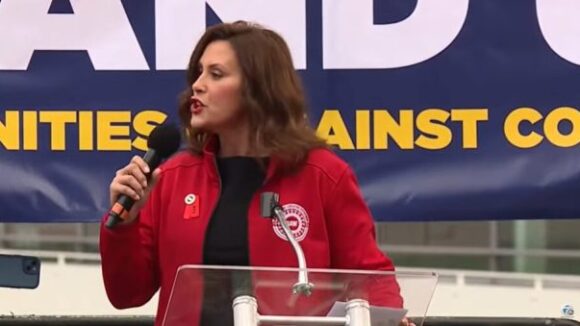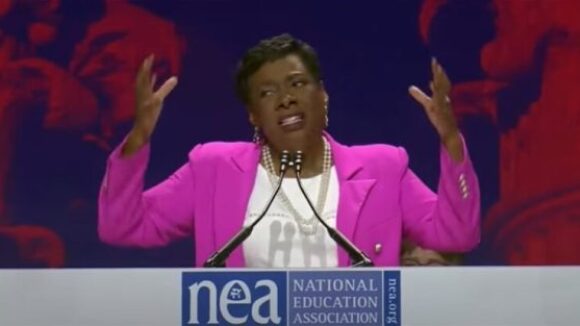Tyranny Triumphs in the Great Lakes State
Ignoring ample evidence of forced unionism’s unfairness and its damaging impact on jobs and incomes, Big Labor Michigan Gov. Gretchen Whitmer signed Right to Work destruction in 2023.
Unlike Unionized Workers’ Pension Funds, Union Bosses’ Are Secure

There’s no denying the fact that federal labor law grants union officials extraordinary power over unionized employees. More candid apologists for union monopoly bargaining and forced union dues and fees have long acknowledged that fact.
Authorizing union bosses to get workers who don’t wish to join a union fired for refusing to fork over union dues or fees is coercion, blunt Big Labor apologists concede, but it is for the workers’ “own good.”
In Practice, Forced Unionism Is Impossible to Defend
Big Labor academic Allan Pulsipher once explicitly defended compulsory unionism as a “legitimate form of coercion in a free market economy”!
Reasonable people may disagree about whether it is theoretically possible that a worker could benefit from being forced to allow an unwanted union to have “exclusive” power to negotiate with the business over his or her pay, benefits, and working conditions.
Some well-intentioned people might even be able to defend, in theory, forcing workers to pay dues or fees for Big Labor “services” they didn’t ask for, and don’t want.
However, practical experience shows that union bosses rarely wield their coercive privileges to achieve objectives furnishing long-term benefits to unionized workers. Instead, union dons take care of themselves.
Union Chiefs ‘Know How to Fund a Pension Plan Properly, If They Choose to’
One remarkable example of how forced unionism benefits union bosses, not workers, pertains to pension funds.
As economists Diana Furchtgott-Roth and Andrew Brown pointed out in a well-documented study for the Hudson Institute late last year, the pensions that monopolistic unions negotiate for workers are disproportionately underfunded, compared with other pensions.
In 2006, for example, the last year completely unaffected by the recent recession, only 17% of union-negotiated pension plans were fully funded according to the criteria established by the federal Pension Protection Act (PPA).
Under the PPA, pension funds that have less than 80% of the assets needed to pay out scheduled benefits are considered “endangered.” In 2006, 41% of union-negotiated funds were endangered. In fact, union-negotiated funds were three times as likely to be endangered as nonunion funds.
And union-negotiated plans were 13 times more likely (13% vs. 1%) to fall under the PPA’s “critical” status, reserved for pensions that are less than 65% funded.
As Ms. Furchtgott-Roth pointed out in a follow-up op-ed for the New York Daily News, union chiefs “know how to fund a pension plan properly, if they choose to.”
She and Mr. Brown sampled 30 union professional staff pensions “among unions that sponsor the largest 46 rank-and-file” multiemployer plans and found that union bosses’ own plans “were 93% funded,” whereas the worker plans had only 70% “of the funds needed to satisfy their obligations.”
‘A Worker Is the Best Judge of Whether He or She Benefits From Unionism’
National Right to Work Committee President Mark Mix commented:
“The recent Hudson Institute study contrasting the pension security of unionized employees with those of union-free employees and of union bosses illustrates the fact that employees are typically harmed, not helped, by compulsory unionism.
“Undoubtedly, some employees believe they benefit from being in a union. But the system only works for employees as a group and for the country when we trust employees to join and pay dues to the union voluntarily.
“A worker is the best judge of whether he or she benefits from unionism.”
Mr. Mix concluded that the Hudson Institute pension study reaffirms the need for passage of the National Right to Work Act, introduced in the current Congress by Iowa GOP Rep. Steve King as H.R.4107.
H.R.4107 would repeal all federal labor-law provisions that authorize the firing of employees for refusal to pay union dues or fees.
Enactment of this bill, Mr. Mix noted, “would greatly strengthen union officials’ incentive to do what’s best for the employees they purport to represent, rather than feather their own nests.”
He encouraged Committee members across the country to contact their congressmen and urge them to cosponsor H.R.4107, the National Right to Work Act, if they have not already done so.

Ignoring ample evidence of forced unionism’s unfairness and its damaging impact on jobs and incomes, Big Labor Michigan Gov. Gretchen Whitmer signed Right to Work destruction in 2023.

Largely thanks to the Right to Work attorney-won U.S. Supreme Court decision in Janus v. AFSCME, union bosses like NEA President Becky Pringle are no longer able to block virtually all meaningful education policy reforms.

Avelo employee Kim Howard believes all the firm’s flight attendants should get to vote on continued AFA rule. Credit: WTNH-TV (ABC,…